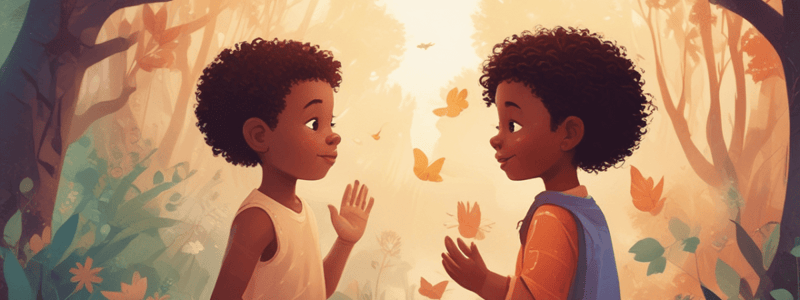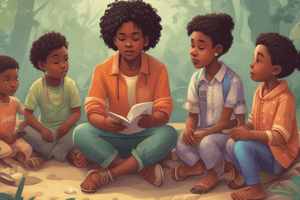Podcast
Questions and Answers
Why is it essential to support individuality in early childhood education?
Why is it essential to support individuality in early childhood education?
- To standardize educational approaches
- To impose a predetermined ideal on children
- To focus only on academic achievement
- To respect and celebrate each child's unique characteristics (correct)
According to Jess Lair's quote, what should children be treated as?
According to Jess Lair's quote, what should children be treated as?
- Molded into a specific shape
- Robots to be programmed
- People to be unfolded (correct)
- Objects to be controlled
How can educators adapt teaching methods to support individuality?
How can educators adapt teaching methods to support individuality?
- By conducting regular assessments to monitor individual development
- By incorporating diverse materials and flexible classroom spaces (correct)
- By using a one-size-fits-all approach
- By eliminating options for children with disabilities
What is the goal of recognizing and valuing individuality in early childhood education?
What is the goal of recognizing and valuing individuality in early childhood education?
Why is it important to provide children with personalized learning approaches?
Why is it important to provide children with personalized learning approaches?
What is crucial in providing feedback to preschool children?
What is crucial in providing feedback to preschool children?
Why is it important to collect information from parents about their child's interests and preferences?
Why is it important to collect information from parents about their child's interests and preferences?
What is the purpose of regular updates and parent-teacher conferences?
What is the purpose of regular updates and parent-teacher conferences?
What is the benefit of using user-friendly apps or websites for communication with families?
What is the benefit of using user-friendly apps or websites for communication with families?
What is the outcome of implementing effective strategies to engage families in the preschool environment?
What is the outcome of implementing effective strategies to engage families in the preschool environment?
Flashcards are hidden until you start studying
Study Notes
Supporting Individuality in Early Childhood Education
- Recognizing and valuing individuality in early childhood education is essential for fostering a nurturing and inclusive environment.
- This approach involves attentive observation and engagement with each child to understand their unique characteristics, interests, and developmental needs.
- Offering tailored opportunities allows children to express themselves and explore at their own pace, enhancing their growth and self-confidence.
- Emphasizing individuality in early education prepares children for future challenges, encouraging them to become creative problem solvers and thoughtful lifelong learners.
The Importance of Recognizing Individuality
- Children are unique individuals with their own thoughts, feelings, and personalities that should be respected and nurtured.
- Recognizing and valuing individuality helps children to develop their own sense of self and respect for others.
- This approach enables children to flourish and become their best selves.
Supporting Individuality in Preschool
- Adapting teaching methods, creating an inclusive environment, and recognizing each child as an individual are crucial for fostering an environment where each child feels valued and understood.
- Personalized learning approaches involve regular observation to gather insights into each child's unique preferences, abilities, and developmental needs.
- Activities can be modified to suit individual learning styles and developmental levels, ensuring that all children can be challenged and achieve success.
Creating an Inclusive Environment
- Integrating diverse materials to reflect and celebrate the diversity of backgrounds, abilities, and family structures is essential for creating an inclusive environment.
- Providing books, toys, and educational materials that include diverse representations and themes can help to normalize diversity.
- Designing flexible classroom spaces to accommodate different learning preferences and activities is vital for creating an inclusive environment.
Individual Recognition and Feedback
- Making each child feel seen and valued through individual recognition and engagement is crucial for fostering personal growth and confidence.
- Providing customized feedback that is specific to each child's activities and development is essential for reinforcing positive development and providing guidance for improvement.
Engaging Families in the Preschool Environment
- Active family involvement and responsive communication are key components for supporting the individuality and overall development of each child.
- Collecting detailed information from parents about their child's interests, habits, and preferences is essential for tailoring the educational approach to meet the unique needs of each child.
- Regular updates and scheduled parent-teacher conferences can help to facilitate responsive communication and ensure that families are informed about their child's progress.
Studying That Suits You
Use AI to generate personalized quizzes and flashcards to suit your learning preferences.




